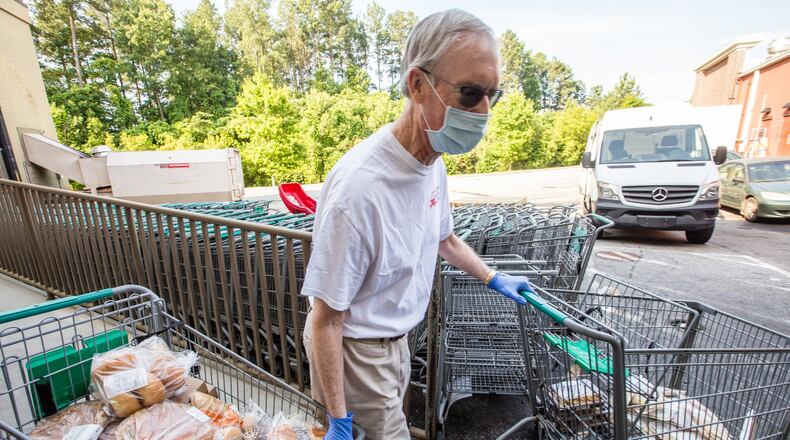For seven years, Ned Cone has been part of a behind-the-scenes operation to rescue surplus food that was on its way to the garbage bin at grocery stores, instead taking it to food pantries or homeless shelters that give to people in need.
But now, in the midst of a pandemic that has put thousands out of work, Cone, a volunteer for Second Helpings Atlanta, feels like the mission has never been more important. Second Helpings picks up unused food from restaurants and grocery stores to redistribute it to charities around metro. Cone recalled a recent delivery to the Community Assistance Center, a nonprofit in Sandy Springs.
“I pulled up to the receiving area where I take the food in, and I saw a line of people going around the building waiting to pick up food that we delivered that day,” said Cone, a 68-year-old Vinings resident. “The need is increased many times over.”
As the food supply chain remains upended by shortages and closures that began in March, and more people face food insecurity due to a loss of income, the pandemic has indirectly changed how many are thinking about food surplus and food waste. Second Helpings, for example, said that since the pandemic hit, it has done an increased amount of deliveries of food that may be approaching its “sell by” date, but is still safe to eat.
Restaurants, growers and other groups have begun making extra efforts to donate surplus food to the rising number of people at risk of going hungry. Similar charitable work was being done before the pandemic, of course, but leaders say the efforts have expanded and received greater support during the pandemic.
RELATED NEWS
“People really are paying attention,” said Andrea Jaron, the executive director of Second Helpings, adding that many are now “highly aware of the fact that the increase of food insecurity in our community is just off the charts, and people want to help.”
The Atlanta Community Food Bank estimated that the number of people needing donated food increased about 30 to 40% after the pandemic hit, as lines stretched for blocks at some recent food giveaway events.
Second Helpings has done more than 90 additional food pickups since the pandemic began, Jaron said, though the nonprofit drastically reduced the number of volunteers it uses due to safety concerns. When the virus canceled sporting events, closed restaurants and shuttered corporate kitchens, many businesses had surplus food but none of their regular demand.
“As they saw what was happening, they realized that they didn’t want their food to go to waste,” Jaron said. “We got lots and lots of calls saying, “Hey, can you make arrangements to come pick up this food and find someone to deliver it to?’”
Mercedes-Benz Stadium and State Farm Arena, for example, were gearing up for the NCAA Final Four tournament in Atlanta and other games when the pandemic began. Once the games were canceled, food the arenas no longer needed was then picked up by Second Helpings, Jaron said.
One morning earlier this week, Cone’s pickup route included a Sprouts Farmers Market and Trader Joe’s in Cobb County. Pulling up to the back loading docks, grocery store staff members helped him load up a van with more than 500 pounds of produce, dairy and baked goods.
He then drove it downtown to the The Shepherd’s Inn, a homeless shelter for men. Mark Crockett, the chef at the shelter, said the food donations are especially needed now, when many of the men living there are staying there throughout the day due to the virus.
“This helps out a lot. A whole lot,” Crockett said while unloading the grocery store goods from Cone’s truck.
Several metro Atlanta restaurants — forced to close their dining rooms for several weeks due to the coronavirus — have also pivoted to helping those facing food insecurity.
Petit Chou, a French bistro in Cabbagetown, temporarily shut down regular service when the pandemic hit. Instead of serving customers, Executive Chef Garrett Wheeler began cooking dinners for people in the community who needed them, relying on donations to support the operation. A friend, Angela Russell, quickly mobilized a team of local volunteers who deliver restaurant-quality meals to 50 to 60 homes in Atlanta every weekday.
“They at least know they can count on one meal a day that they don’t have to worry about,” said Russell, who was recently laid off from her job in a contractor’s office.
Besides donations of packaged and prepared foods, the federal government has stepped in to redirect fresh goods that farmers are unable to sell.
Through the Coronavirus Food Assistance Program and the Farmers to Families Food Box program, the U.S. Department of Agriculture plans to purchase billions of dollars worth of food from farmers who have suffered losses due to the pandemic, distributing that produce, dairy, and meat to food banks, pantries and other organizations.
Locally, DeKalb County recently partnered with the Georgia Department of Agriculture to buy 18 tons of chicken and produce to give out to families in need.
Many worry that issues surrounding hunger will continue despite the best efforts to make use of surplus food. At the recent food giveaway in DeKalb, for example, dozens of cars were turned away after crews ran out of supplies.
Rosario Hernandez, who helps lead Historic Westside Gardens, a group working to provide more fresh food to residents on Atlanta’s westside, said she sees the benefit of the efforts to redirect surplus food. Hernandez said the organization recently received donations of produce that came from Georgia farmers.
“If you grew this whole field of lettuce and arugula and all those restaurants are closed, what are you gonna do?” she said. “Give it away. It’s the best thing.”
About the Author
The Latest
Featured




